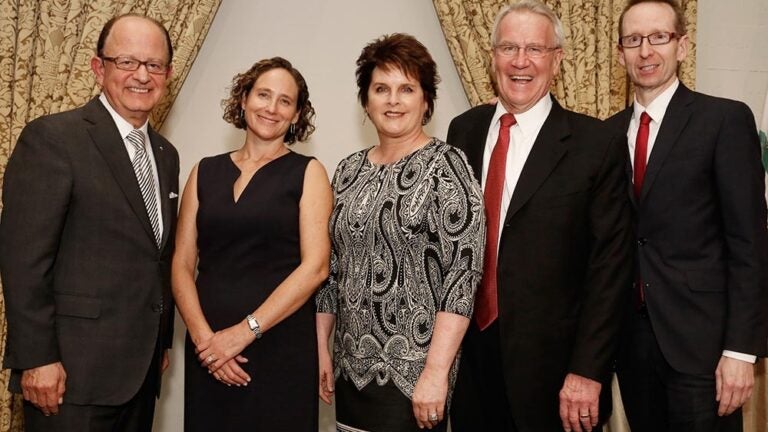
New dean outlines her vision for the College during installation ceremony
Physicist Amber Miller was officially installed as dean of the USC Dana and David Dornsife College of Letters, Arts and Sciences on Sept. 27 at Town and Gown on the University Park campus. Miller outlined her vision for the College, and her desire to re-engage the public with university scholarship and renew understanding of why the arts and sciences matter. View her complete installation address in the video below or read her remarks online.
Seeking New Ways of Thinking
Amber Miller’s research as an experimental cosmologist has allowed her to look back in time billions of years to the origins of the universe. Now, as the 22nd dean of USC Dornsife, her sights are set on the future.
Miller brings both a depth and breadth of research and leadership experience driven by what she jokingly describes as her “intellectual impatience.” It has led her to traverse traditional academic boundaries through cross-disciplinary collaborations and to apply her training as an astrophysicist to real-world problems.
“Growing up, I was always interested in both the man-made and natural worlds and how they work, but I was also intrigued by how people work, how institutions and societies work,” she said. “That curiosity led me to keep exploring. I was always looking for the next subject that I didn’t know about, that I couldn’t yet figure out.”
A California native from Malibu, Miller attended the University of California, Berkeley as an undergraduate, with an invitation to play in the university’s symphony orchestra. She wasn’t sure what she wanted to study until she was introduced to the concept of relativity in a freshman seminar. “I realized there was a whole different way of looking at the world, and that set me off in a new direction.”
Miller declared a physics and astronomy major, graduating with a Bachelor of Arts degree in 1995. She then attended Princeton University to pursue an M.A. and a Ph.D. in physics. She earned a prestigious Hubble Fellowship at the University of Chicago and was soon invited to join the faculty of Columbia University, where she started her own research group in 2002. Named dean of science in 2011, she assembled a team of faculty to work on the first strategic plan for the sciences at the university.
Her academic research focuses on understanding the origin of the universe, its fundamental nature and evolution. As a physicist, she led her team to design, build and deploy balloon-borne telescopes to gather data on the conditions in the universe when it was less than one second old. Studying the traces of the Big Bang has taken Miller to 17,000 feet above sea level in the Chilean Andes, to the Antarctic ice and to the arid deserts of the American Southwest.
Miller has published more than 100 scientific papers, and her honors and awards include a National Science Foundation Career Award, an Alfred P. Sloan Fellowship and a Lenfest Distinguished Faculty Award. In addition, she was a NASA Graduate Research Program Fellow and is a fellow of the American Physical Society.
As Miller developed her early universe research, she also pursued her interest in societal issues by becoming a member in 2008 of the Council on Foreign Relations, among the country’s most respected independent think tanks devoted to international affairs.
“I think, for a lot of academics, they’re most comfortable when they’re deep inside a complex problem,” she said. “I really enjoy thinking that way as well, but I’m equally intrigued by how the answers to these disparate problems — ones far beyond my discipline — can fit together.”
As a member of the council, Miller found that her ability to analyze and build the advanced technological equipment needed for her research experiments could also serve her community: In 2009, she became the chief science advisor for the New York Police Department’s Counterterrorism Bureau.
Serving for two years, she worked with the bureau to create and manage teams to analyze the best use of the city’s counterterrorism equipment. While advising the Police Department, Miller saw how a university research scientist’s analytical thinking and training could support agencies and institutions trying to solve real-world problems.
“That realization opened up a new perspective for me. As faculty and researchers, we have a tremendous amount to offer our communities, and we need to find opportunities to use our intellectual resources to partner with them.
“In an ever more complex and globally interconnected world, the capacity to think analytically is vital. We have a wealth of intellectual talent in our research universities, people whose disciplines train them to deconstruct problems. As a scientist, and now as dean of USC Dornsife, I am constantly asking myself, ‘How can academics apply their skills to engage with people beyond the university? How can we help?’”
Now, as she takes the helm at USC Dornsife, Miller sees exciting opportunities for the College. She believes strongly in USC Dornsife’s capacity to become a model of the heart of a 21st-century research institution — a model that requires a new way of engaging with the world beyond the university to create positive change.
She is focused on supporting humanities, social sciences and natural sciences scholars in their pursuit of education and the creation of new knowledge and ideas for the sake of inquiry at the highest intellectual level, while also developing opportunities for these scholars and their students to apply their ideas to the many challenges facing society.
“The opportunity to lead at USC Dornsife — the heart of the university — and think deeply about further developing excellence in the production of new knowledge, while rethinking how we engage with the rest of the world and particularly Los Angeles, one of today’s most dynamic cities, is very exciting.”